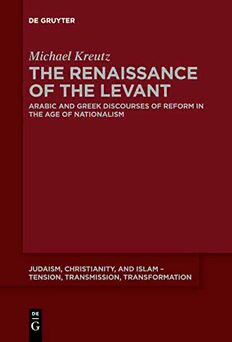
The Renaissance of the Levant: Arabic and Greek Discourses of Reform in the Age of Nationalism PDF
Preview The Renaissance of the Levant: Arabic and Greek Discourses of Reform in the Age of Nationalism
Michael Kreutz The Renaissance of the Levant Judaism, Christianity, and Islam – Tension, Transmission, Transformation Edited by Patrice Brodeur, Alexandra Cuffel, Assaad Elias Kattan, and Georges Tamer Volume 13 Michael Kreutz The Renaissance of the Levant Arabic and Greek Discourses of Reform in the Age of Nationalism ISBN 978-3-11-063122-7 e-ISBN (PDF) 978-3-11-063400-6 e-ISBN (EPUB) 978-3-11-063134-0 ISSN 2196-405X Library of Congress Control Number: 2019931215 Bibliografic information published by the Deutsche Nationalbibliothek The Deutsche Nationalbibliothek lists this publication in the Deutsche Nationalbibliografie; detailed bibliografic data are available on the Internet at http://dnb.dnb.de. © 2019 Walter de Gruyter GmbH, Berlin/Boston Printing and binding: CPI books GmbH, Leck www.degruyter.com Contents Acknowledgments VII Introduction 1 New Ideas, Crumbling Orders 11 . Cultural Entanglements 11 . Enlightenment in Perspective 17 . Theology and Science 26 . Agents of Reform 36 . Napoleon in Egypt 49 The Mediterranean Dawn 55 . The Greek Rise to Independence 55 . The End of Eastern Decline 63 . A Feminist Revolution 77 . Towards a New Humanism 84 . From Turkey to Japan 99 Civilizations Drifting Apart 111 . The Past and the Future 111 . Mapping Out New Orders 129 . Eastern anti-Westernism 141 . After Disillusionment 152 Concluding Thoughts 157 Timeline 160 Sources 165 Literature 167 Index 183 Acknowledgments I would like to express my warmest thanks to Assaad Kattan (Münster) for his wonderful intellectual support for my project under the original title “Beyond the centers: Religion and Enlightenment by the example of Greek and Arab ChristianityinSoutheastEuropeandtheMiddleEast(JenseitsderZentren:Reli- gion und Aufklärung am Beispiel von Islam, griechischem und arabischem Chris- tentum in Südosteuropa und im Vorderen Orient); to the DFG for funding this book; to the Cluster of Excellence at the Universityof Münster, i.e.the working platformTransculturalEntanglements,forprovidingaconduciveenvironment;to themembersofmyprojectgroupTransferbetweenworldreligionsfortheirfeed- back;toKatharinaLinnemann(Münster)forreviewingandimprovingthemanu- script; and to David West (Münster) for careful scrutinyof my English. Last but notleast,Iwouldliketothankmyparentsandfriendsmostheartilyfortheirin- valuable and strong backing while Iwas writing this book. https://doi.org/10.1515/9783110634006-001 Introduction SincetheMediterraneanconnectscultures,Mediterraneanstudieshavebydefi- nitionaninterculturalfocus.Thisisavastfieldandrequiresacommandofdif- ferent languages not necessarily related to each other.Throughout the modern era,the OttomanEmpirehas hada lastingimpacton theculturesand societies of the Southern and Eastern Mediterranean. It is for this reason that it makes sense to investigate both Greek and Arabic sources – two essential languages inthatareathatareconnectedbythefactthatOrthodoxChristianshavewritten inbothofthem.Thisbookwillshedsomelightonthesignificanceofideasinthe politicaltransitionsoftheirtime,andonhowtheproponentsofthesetransitions oftenbecamesooverwhelmedbytheeventsthattheyhelpedtriggeradjustments to their own ideas. Thebookisthereforebothasurveyofintellectualhistoryfromtheperspec- tive of mainly Greek and Arabic speakers.Greekand Arabic challenge attempts tomodernizingculturein theirown specialwaysincetheyarelanguagesbeing associated with the Bible and the Quran. founding texts of two great civiliza- tions. Being languages of erudition Greek and Arabic used to connect different peoplesoveravaststretchofterritorywhichisanotherchallengetopoliticalre- forms oriented towards an order of nation states where languages no matter what historical baggage they carry have to be forged into national languages. On a final note,the discourses in Greek and Arabic reflect the provinces of the OttomanEmpireand itwillbe interestingtoseetheirdifferences and common- alities. The discourse which is I examine here is pivoting around religion but with a secular outlook. I. Intellectual history has become a neglected field of research and a nineteenth century remnant¹ dismissed by historians and political scientists alike for rea- sonsnotentirelyclear.InGermanyitwasnotproperlyrestoredaftertheSecond World War,² but has received more academic attentionduringthe last tenyears IsaiahBerlinandRaminJahanbegloo,DenIdeendieStimmezurückgeben:Eineintellektuelle Biographie in Gesprächen (Frankfurt/Main: Fischer, 1994), 118; Wilhelm Schmid, Die Geburt derPhilosophieimGartenderLüste(Frankfurt/Main:Suhrkamp,[1987]2000),23. WilhelmBleek,GeschichtederPolitikwissenschaftinDeutschland(Munich:Beck,2001),16–9; PaulNolte,TransatlantischeAmbivalenzen:Studien zurSozial-undIdeengeschichte des18.bis https://doi.org/10.1515/9783110634006-002 2 Introduction or so. In the English-speaking world intellectual history is largely associated withtheCambridgeSchoolanditsproponents,QuentinSkinnerandJGAPocock. Skinner’sapproachwasakintothatofLeoStrauss,whodefinedthetaskofany reader as being to understand the author as he or she understood him or her- self.³ However, Skinner was criticized by Hans-Georg Gadamer, who argued that any attempt to reveal the original intention of the author of a source was boundtofail.⁴ The CambridgeSchool earned its stripeswhenit managedtore- writepartsofthehistoryofEnglishpoliticalthoughtbasedonitsanalysisofpat- terns of thought typical of certain strata of society at a certain period of time.⁵ However, its equation of the limits of language with the limits of human action wasunconvincing,sincelanguagecan adapttothemostdiversepoliticalsitua- tions,which means that the individual human does not surrender to concepts that lie beyond his or her influence.There was a similar discussion about the FrankfurtSchoolwhenJürgenHabermasmadelanguageanineluctableelement of human understanding, something that was criticized by CS Pierce, who ar- gued that there existed nothing in this world that warranted its own prerequi- sites.⁶ AsthepoliticalscientistHannahArendtargued,however,intellectualhisto- ryiskeytounderstandingthepresent,sincepoliticalideasfunctionasreference parametersforpoliticalactorstodecideandjudgeintimesofuncertainty.⁷Much of what intellectual history is able to unearth is the struggle for liberty and its double sense, both positive and negative,which becomes manifest in political independence as well as in the rule of law.We often find that both ideas are 20. Jahrhunderts (Berlin: De Gruyter, 2014): 391–5; cf. Michael Kreutz, “Ideengeschichte als Blindstelle historischer Forschung in Deutschland,” in michaelkreutz.net, Aug. 16, 2017, URL=http://www.michaelkreutz.net/2017/ideengeschichte-als-leerstelle-der-heutigen-forschung/ [Aug.24,2018]. KlausOehler,BlickeausdemPhilosophenturm:EineRückschau(Hildesheim,ZurichandNew York:Olms,2007),187;cf.JohnGAPocock,“SpracheundihreImplikationen:DieWendeinder ErforschungdespolitischenDenkens,”inDieCambridgeSchoolderpolitischenIdeengeschichte, ed.MartinMulsowandAndreasMahler(Berlin:Suhrkamp,2010):88–126,here113.;Quentin Skinner,VisionendesPolitischen(Frankfurt/Main:Suhrkamp,2009),81. David Harlan, “Der Stand der Geistesgeschichte und die Wiederkehr der Literatur,” in Die CambridgeSchoolderpolitischenIdeengeschichte,ed.MartinMulsowandAndreasMahler(Ber- lin:Suhrkamp,2010):155–202,here161,165–7,cf.ibid.189. Ibid.,168–9. KlausOehler,BlickeausdemPhilosophenturm,op.cit.,382–4. GritStraßenberger,“HannahArendt,MichaelWalzerundMarthaCravenNussbaum,”inPo- litischeIdeengeschichteim20.Jahrhundert:KonzepteundKritik,ed.HaraldBluhmandJürgen Gebhardt(Baden-Baden:Nomos,2006):155–80,here165.
